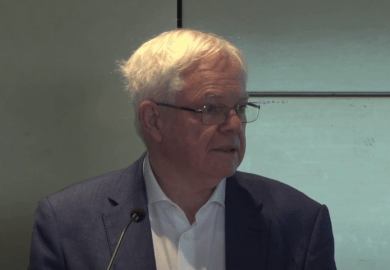For decades, US reformers framed the campaign to boost college enrolment of black people and other disadvantaged minorities as an urgent matter of social and economic justice. “A mind is a terrible thing to waste,” declared the iconic slogan of the United Negro College Fund, founded in 1945.
In 1920, barely 1 per cent of African American and Latino young adults combined had earned a bachelor’s degree or higher, according to the National Center for Education Statistics. By 2022, the proportion of black and Latino degree-holders in their mid to late twenties had reached 28 and 25 per cent respectively.
That kind of progress is vital for upward mobility in a changing economy that, for a century, has increasingly rewarded advanced skills acquired in secondary and then postsecondary education. Yet the progress is too slow. What’s more, the degree attainment gap remains large and troubling: 45 per cent of white young adults held at least a bachelor’s degree in 2022. Overall, close to seven in 10 recent high school graduates enrol in college, but completion rates for black and Hispanic people, a growing percentage of the 21st-century US workforce, continue to lag well behind those of white people.
For years, this positive but uneven trajectory spurred calls for a renewed effort to promote more college attendance and completion for educationally disadvantaged minority groups. Yet, lately, many would-be reformers have embraced a new refrain instead. They say degree requirements for jobs, not lack of postsecondary education, are the key impediment to black and Latino progress. Initiatives such as the OneTen coalition and the nonprofit Opportunity@Work have prompted corporate leaders and state governments to stop screening for degrees in employment listings.
The credential barrier is a particular problem for African Americans and Latinos, advocates contend, because they’re so much less likely than white people to hold bachelor’s degrees. In an era of widespread scepticism about the value of degrees, they say minorities, in particular, benefit if hiring reflects skills acquired in other ways – via certificate programmes or on-the-job learning, for example.
In fact, however, the real risk for black people and Latinos is that pretending degrees are optional will funnel them into short-term, non-degree programmes that lead to lower wages and much less upward mobility. “There’s never been a worse time to not be a college graduate,” said Susan Dynarski, a Harvard University economist and national authority on expanding college access and affordability, in 2012. If employers truly cared less about degrees, she reasoned, the long-term economic data would reveal a lower average salary payoff for bachelor’s degrees. They didn’t then and they still don’t. The growth rate of the college wage premium has flattened in the past 15 years, but it nonetheless remains near a historic high even as a high school diploma alone becomes less and less valuable.
Still, a complex mix of developments strengthened the pressure for BA alternatives. These developments included uncertainty and anxiety about the market value of degrees; a strong public (and characteristically American) belief in practical as opposed to supposedly ivory-tower training; the rising desire for inexpensive, short-term, job-oriented credentials; and the cataclysmic impact of the Covid-19 pandemic on enrolments.
During the pandemic, growing interest in skills-based, online credentials was particularly pronounced among lower-income and minority adults, and the credit rating firm Moody’s projected in 2020 that short-term credentials would continue to be the fastest-growing part of the higher education market.
Still, a clear-eyed look at the evidence suggests that there are huge variations in the quality and payoff of these degree alternatives. A 2021 study by the thinktank New America warned that the short-term credentials often held by workers in female-dominated occupations led to “substantially” lower earnings, while Latinos and, especially, African Americans with certificates had lower earnings than white workers with certificates.
Moreover, while there’s nothing wrong with short-term programmes that lead to well-paying jobs, the bachelor’s degree remains the “surest gateway to economic and social progress”, according to Anthony Carnevale, director of Georgetown University’s Center on Education and the Workforce. “We must guard against the mindset that short-term training and sub-baccalaureate awards are good enough for the least advantaged among us.”
Part of the challenge is the reality that skills-based credential programmes are also stratified by wealth and race. Non-degree credentials for in-demand fields such as computer science and engineering are “overwhelmingly populated by white, wealthier students”, says Josh Wyner, executive director of the College Excellence Program at the Aspen Institute. “Where are the black and Latino students, the women? They’re in low-wage CTE [career and technical education] programmes.”
Little wonder that worries about the message college critics are sending to black people and Latinos are being expressed by influential education leaders, including Aimée Eubanks Davis, founder of minority career support organisation Braven, and Steve Bumbaugh, senior vice-president for college, career and digital access at the College Board. Of course we need better non-degree alternatives, along with improved ways for adults to earn degrees over time and to combine skills-based credentials with existing qualifications. And, yes, degree requirements can be a barrier. But so is a failure to build human capital, and the data tell us clearly that, despite everything, college still does that effectively.
One day, with the right mix of alternative credentials in place, together with research demonstrating their value over time, widespread hiring for skills might become a reality, with demonstrably positive career results for African Americans, Latinos and everyone else. Right now, however, it would be irresponsible to give young people advice about a wished-for hiring landscape that does not currently exist.
Ben Wildavsky is a visiting scholar at the University of Virginia School of Education and Human Development and host of the Higher Ed Spotlight podcast. His new book, The Career Arts, was published on 14 November by Princeton University Press.
Register to continue
Why register?
- Registration is free and only takes a moment
- Once registered, you can read 3 articles a month
- Sign up for our newsletter
Subscribe
Or subscribe for unlimited access to:
- Unlimited access to news, views, insights & reviews
- Digital editions
- Digital access to THE’s university and college rankings analysis
Already registered or a current subscriber? Login








